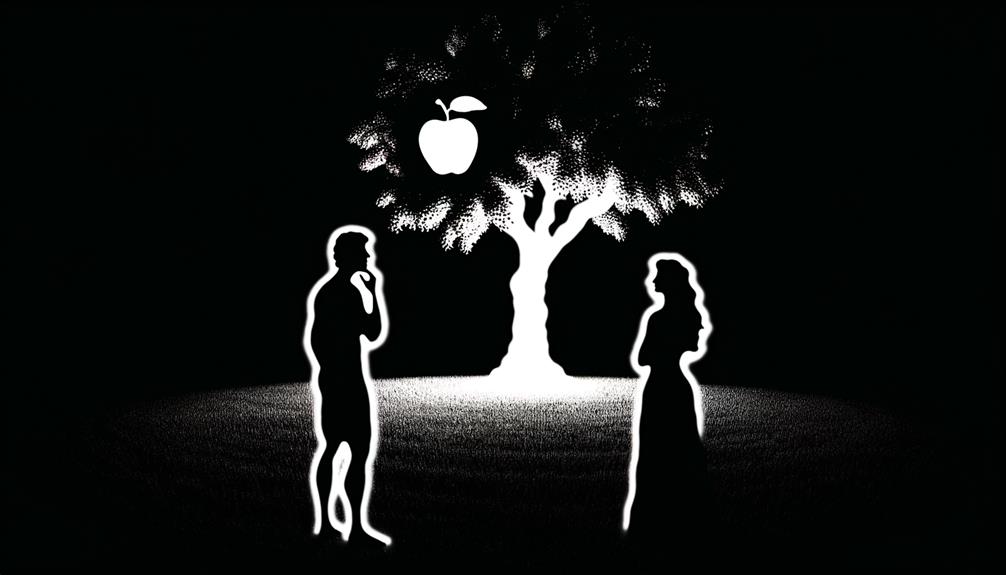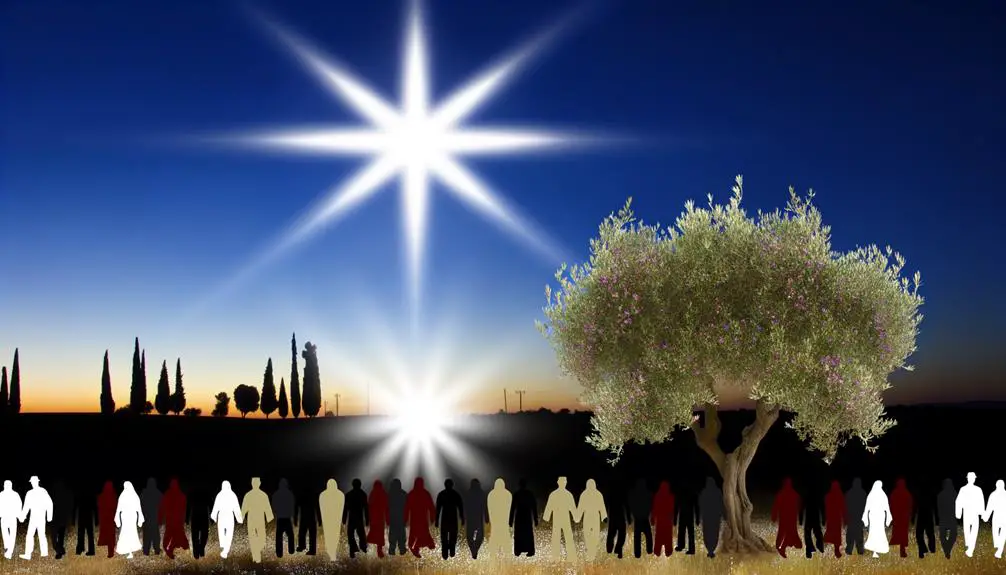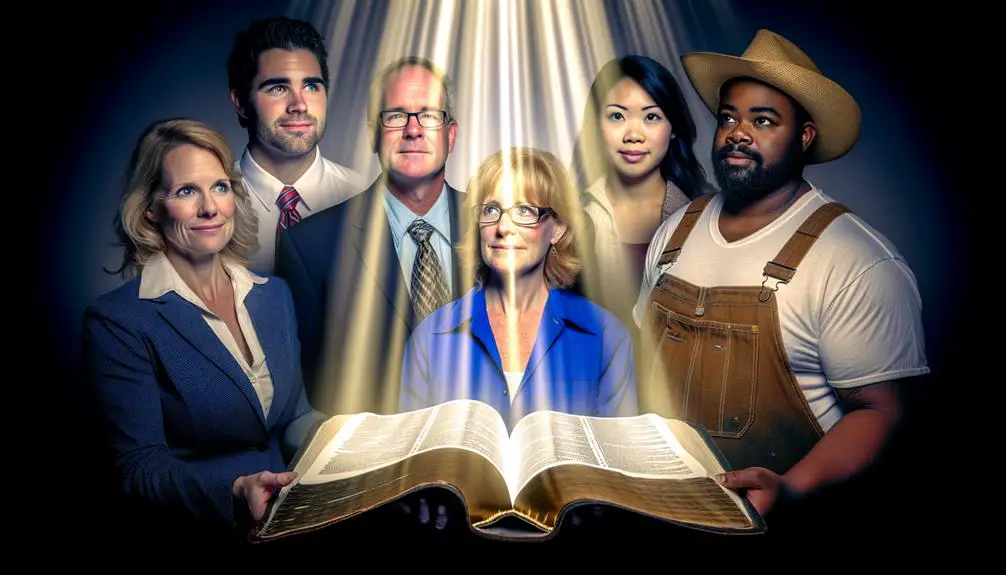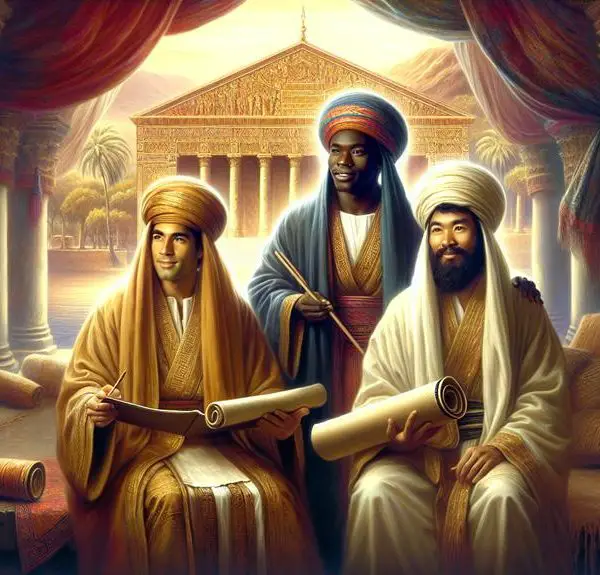Yearn to uncover how the Bible's redemption story weaves through history, inviting you to discover its impact on your life journey.

The Story of Redemption in the Bible
As they say, every cloud has a silver lining, and the biblical narrative of redemption beautifully illustrates this through the tapestry of history and spirituality.
You'll journey from the fall of humanity, witness covenants made and broken, and stand at the crossroads of prophecy and fulfillment with the life of Jesus.
This story doesn't just belong to the past; it echoes in your life today, offering insights that might change how you view the world and your place in it.
Let's embark on this journey together, and you might find more than you're searching for.
Key Takeaways
- Redemption in the Bible unfolds through God's covenant with Abraham, the Exodus, and ultimately, Jesus's life, death, and resurrection.
- Jesus's mission, marked by parables, miracles, and teachings, emphasizes love, forgiveness, and the accessibility of God's kingdom to all.
- The crucifixion and resurrection of Jesus are central to the Christian redemption narrative, symbolizing hope, salvation, and victory over death.
- Biblical redemption shapes believers' lives today, guiding ethical behavior, deepening faith, and fostering community renewal.
The Fall of Humanity

The Fall of Humanity, a pivotal event described in Genesis, marks humanity's initial disobedience to God and sets the stage for the biblical narrative of redemption. This moment, steeped in theological significance, introduces the concept of original sin, a fundamental aspect that shapes the Christian understanding of human nature and salvation. You're invited to explore this crucial turning point, where human disobedience ruptures the perfect relationship between humanity and the Divine, necessitating a long journey towards redemption.
Original sin, as gleaned from the Fall, isn't merely an act but a condition passed down through generations, tainting human nature and severing the innate communion with God. This inherited sin emphasizes the profound impact of Adam and Eve's choice to defy God's command, highlighting the weight of human actions and their cosmic repercussions. It's a stark reminder of the fragility of obedience and the catastrophic consequences of straying from divine will.
The narrative of the Fall isn't just about the introduction of sin into a pristine world; it's a foundational story that illustrates the gravity of human disobedience. It serves as a lens through which the entirety of Scripture can be interpreted, offering insights into the human condition, the justice and mercy of God, and the relentless pursuit of humanity's redemption. As you delve deeper into the complexities of original sin and human disobedience, you're confronted with the sobering reality of humanity's fall but also with the hopeful promise of redemption that permeates the biblical text. This duality lies at the heart of the Christian faith, urging believers to reflect on their own lives and the continual need for grace and salvation.
The Covenant With Abraham

As we reflect on humanity's fall and the ensuing quest for redemption, it's crucial to examine God's covenant with Abraham, a defining moment that further unfolds the divine plan for salvation. This covenant, marked by profound promises, establishes Abraham as a pivotal figure in the narrative of redemption. It's through Abraham's lineage that God promises to bless all nations, introducing a beacon of hope amidst humanity's estrangement from the divine.
Abraham's hospitality serves as a testament to his righteousness. When he welcomes three strangers, who are manifestations of the divine, into his home, he unknowingly entertains God's presence. This act of kindness underscores a critical lesson in the biblical redemption story: God's blessings often follow genuine acts of faith and hospitality. Abraham's willingness to serve, coupled with his unwavering faith, sets a precedent for how humanity can engage in a relationship with the divine.
Sarah's laughter, initially an expression of disbelief at the promise of a son in her advanced age, transforms into a symbol of joy and fulfillment as the promise materializes with the birth of Isaac. This shift from skepticism to faith highlights a core theme in the redemption arc: God's promises, however improbable they may seem, are steadfast and reliable.
The covenant with Abraham encapsulates a multifaceted demonstration of faith, obedience, and divine grace. It not only establishes a foundation for the unfolding story of redemption but also illustrates the complexities and nuances of a faith journey, emphasizing that trust in God's promises leads to ultimate fulfillment and salvation.
The Exodus Story

ARTICLE TITLE: Story of Redemption in the Bible
PREVIOUS SUBTOPIC: 'The Covenant With Abraham'
CURRENT SUBTOPIC: 'The Exodus Story'
In the narrative of biblical redemption, God's deliverance of the Israelites from Egyptian bondage through the Exodus epitomizes divine intervention and faith's transformative power. This story isn't just a historical recount but a profound lesson in trust, obedience, and divine leadership. You see, Pharaoh's defiance against God's command to release the Israelites showcased his hardened heart, leading to a series of devastating plagues upon Egypt. It was a stark reminder of the consequences of resisting divine will.
Moses' leadership, on the other hand, stands as a testament to humility and faith. Despite his initial reluctance, Moses answered God's call, becoming the instrument through which God would liberate His people. Moses' journey from a shepherd in Midian to leading the Israelites out of Egypt underscores the transformative power of faith and obedience to God's command.
Aspect |
Significance |
Outcome |
|---|---|---|
Pharaoh's Defiance |
Showcases the futility of resisting God |
Leads to plagues and Egypt's defeat |
Moses' Leadership |
Embodies faith and obedience |
Results in the Israelites' liberation |
Divine Intervention |
Demonstrates God's power and faithfulness |
Ensures the fulfillment of God's promises |
Through the Exodus story, you're invited to reflect on the importance of faith, the consequences of defiance, and the redemptive power of divine intervention. It's a narrative that not only shaped the identity of a nation but also offers timeless lessons on leadership, faith, and the pursuit of freedom.
The Prophets' Promise

Moving beyond the Exodus narrative, you'll find the prophets' promise serves as a cornerstone for understanding God's continuous plan for redemption. The prophets, acting as messengers, were entrusted with delivering both prophetic visions and divine warnings, which collectively painted a picture of hope and restoration amidst a backdrop of disobedience and despair.
Prophetic visions weren't merely foretellings of doom but rather assurances of God's unwavering commitment to His people. They spoke of a time when the broken relationship between humanity and the Divine would be mended, highlighting God's enduring faithfulness.
Divine warnings, on the other hand, served as a call to repentance. They underscored the consequences of turning away from God's statutes but always with the underlying promise of redemption for those who'd return to Him.
To further understand the profundity and complexity of the prophets' promise, consider these three points:
- The Universality of the Message: The prophets spoke to all of Israel, but their messages have transcended time and culture, speaking to believers across generations.
- The Dual Nature of Prophecy: Prophecies often had both an immediate and a future fulfillment, showcasing God's sovereignty over time.
- The Call to Social Justice: Many prophets emphasized the need for societal reform, linking spiritual redemption with ethical living.
In analyzing the prophets' promise, you're invited into a rich tapestry of divine warnings and prophetic visions that together weave a narrative of hope. This narrative underscores not only God's justice but also His unrelenting mercy and love, promising redemption for a world in need.
The Life of Jesus

In exploring the life of Jesus, we encounter the embodiment of God's promise of redemption, a narrative pivotal to understanding the fulfillment of prophetic visions laid out by the prophets. His life begins with the Miraculous Birth, an event that alone signifies the divine intervention in human history. This birth, foretold by prophets, breaks the natural order, signaling that Jesus's mission on Earth isn't just extraordinary but divinely ordained. The Miraculous Birth serves as a foundational piece in the redemption narrative, illustrating that Jesus isn't merely a historical figure but a fulfillment of God's promise to humanity.
As Jesus matures, his ministry expands through his Parables Teaching, a method he frequently uses to convey complex spiritual truths in simple, relatable stories. These parables not only demonstrate Jesus's profound understanding of human nature but also his desire to make the kingdom of God accessible to all. Through these teachings, Jesus systematically dismantles prevailing religious dogmas, challenging his followers to embrace a faith that's both deeply personal and universally inclusive.
Furthermore, Jesus's miracles—ranging from healing the sick to feeding the multitudes—underscore his authority over the natural and spiritual realms, affirming his divinity and the transformative power of faith. Each miracle, each parable, and the very life he lived serve as a testament to the possibility of redemption for humanity, a theme that resonates throughout the Bible.
The Crucifixion and Resurrection

You'll find that the crucifixion and resurrection of Jesus Christ stand as the cornerstone of Christian redemption. His sacrificial death wasn't the end but a means to defeat death itself, showcasing a profound triumph.
This segment explores how these pivotal events encapsulate the essence of hope and salvation in the biblical narrative.
Jesus' Sacrificial Death
Jesus' sacrificial death, marked by the crucifixion and resurrection, stands as a pivotal event that embodies redemption and atonement within Christian theology. This act is deeply rooted in:
- Historical context: The event is recorded in the Gospels, situated within the broader narrative of Roman occupation and Jewish expectation of a Messiah.
- Theological debates: Early Christians grappled with its meaning, seeing it as both a fulfillment of prophecy and a divine mystery that transcends human understanding.
- A framework for redemption: It signifies the ultimate sacrifice for humanity's sins, offering reconciliation with God.
These dimensions combine to present Jesus' death as a cornerstone of faith, inviting believers to explore the depths of grace and the breadth of God's love.
Triumph Over Death
Through the crucifixion and resurrection, every believer encounters the profound reality of victory over death, marking a cornerstone of Christian faith that transcends historical and theological boundaries. This pivotal event not only resolves mortality questions but also assures the promise of eternal life.
Analyzing these events through a scholarly lens, one can't help but recognize the intricate weave of divine justice and mercy. The resurrection, especially, stands as a testament to the power of God to transcend the limitations of human existence. It encapsulates a message of hope, affirming that death doesn't have the final say.
Thus, the narrative of triumph over death fundamentally reshapes the believer's understanding of life, death, and the pursuit of eternal life, anchoring faith in the resurrection's transformative power.
The Impact on Modern Believers

As you explore the impact of the Bible's redemption narrative on modern believers, you'll find it profoundly shapes personal faith, revives communities, and guides ethical living.
This transformative power not only deepens individual spiritual journeys but also fosters collective experiences of renewal. Moreover, it offers a moral compass, directing believers toward lives marked by virtue and integrity.
Personal Faith Transformation
Exploring personal faith transformation reveals its profound impact on modern believers, guiding them through a journey of spiritual renewal and deeper connection with the divine narrative. This transformative journey often begins with two critical phases:
- Spiritual Awakening: You suddenly or gradually become aware of a divine presence in your life, realizing that there's more to existence than the material world.
- Faith Questioning: This phase involves deep introspection and questioning of your beliefs, leading to a more solid and mature understanding of your faith.
The impact of personal faith transformation on modern believers can't be overstated. It leads to a life lived with purpose, guided by values, and enriched by a sense of belonging to something greater than oneself. This journey redefines your understanding of redemption, making it a deeply personal experience with universal implications.
Community Revival Experiences
In the context of modern faith communities, revival experiences serve as pivotal moments that not only rejuvenate spiritual fervor but also reinforce collective identity and commitment among believers. Effective revival strategies hinge on deep, meaningful community engagement, encouraging a shared journey towards spiritual renewal. These strategies often involve communal worship, prayer gatherings, and outreach initiatives, all designed to foster a sense of unity and purpose.
As members of a faith community participate in these revival experiences, they're not just attending events; they're actively engaging in the process of communal transformation. This engagement facilitates a deeper connection to the divine, enriching personal faith while simultaneously enhancing the collective spiritual journey. Ultimately, community revival experiences stand as a testament to the power of collective faith in action, inspiring modern believers to live out their convictions with renewed vigor and purpose.
Ethical Living Guidance
Guidance on ethical living, deeply rooted in biblical teachings, profoundly impacts modern believers by shaping their moral compass and daily actions. The Bible offers timeless principles that assist you in navigating the complex world of ethical dilemmas with grace and wisdom.
- Scriptural Interpretation: You learn to apply ancient wisdom to contemporary issues, fostering moral development in a rapidly changing world.
- Community Accountability: Engaging with fellow believers provides a support system for ethical decision-making, reinforcing the importance of collective moral integrity.
- Personal Reflection: The biblical narrative encourages you to reflect on your actions and their alignment with God's will, promoting continuous ethical growth.
Frequently Asked Questions
How Do Different Christian Denominations Interpret the Concept of Redemption Differently?
Different Christian denominations interpret redemption differently, focusing on justification beliefs and atonement methods.
For instance, Catholics emphasize sacraments and works alongside faith for justification, while Protestants typically stress faith alone.
Orthodox Christians blend liturgical practices with personal faith. Each tradition brings a unique perspective on how believers are reconciled with God, showcasing the diversity within Christianity regarding the path to salvation and the role of Jesus' sacrifice.
What Role Do Angels and Demonic Beings Play in the Biblical Narrative of Redemption?
In exploring the roles of angels and demonic beings, you'll find angels, structured in a hierarchy, serve as messengers and protectors, directly involved in guiding and aiding in spiritual battles.
On the other hand, demonic beings, with their origins rooted in rebellion against the divine, seek to hinder humanity's path to redemption.
Both forces play significant, opposing roles in the spiritual realm, influencing the journey towards or away from redemption.
Are There Any Precursor or Parallel Stories of Redemption in Other Ancient Religions or Cultures That Influenced the Biblical Account?
You're delving into whether ancient religions or cultures have stories that might've influenced the biblical redemption narrative. It's fascinating to explore mythological parallels and consider how cultural interchange could have shaped these tales.
While you're analyzing, remember, this isn't about diminishing the Bible's unique message but understanding the broader context of human storytelling. It's a scholarly approach that respects faith traditions while acknowledging the rich tapestry of human culture and belief systems.
How Has the Concept of Redemption in the Bible Influenced Secular Literature and Art Throughout History?
You might find it fascinating that over 60% of Western literature contains themes inspired by biblical redemption. This concept significantly influences secular literature and art, infusing modern adaptations with rich, symbolic motifs.
Analyzing these works, you'll notice how artists and writers weave redemption narratives into their creations, reflecting a profound understanding of human struggle and hope.
This scholarly exploration reveals the deep-rooted impact of redemption themes across diverse cultural expressions, underscoring their universal resonance.
What Are the Theological Implications of Redemption for Those Who Are Non-Believers or Belong to Other Faiths?
You're exploring how redemption's theological implications reach beyond its religious origins, touching those outside the faith or of different beliefs.
Through universal morality, redemption fosters interfaith dialogue, encouraging a shared understanding of forgiveness and transformation.
It prompts you to consider moral values that transcend religious boundaries, inviting a collective reflection on human nature and ethical living.
This perspective enriches your insight into how deeply intertwined moral principles are, regardless of one's faith.
Conclusion
In the tapestry of redemption woven through the Bible, you find yourself stitched between ancient promises and eternal hope. Your story intersects with Abraham's faith, Moses' courage, and prophets' visions, culminating in the transformative power of Jesus' life, death, and resurrection.
This narrative isn't merely historical; it's the bedrock of your faith, offering a beacon of light in a shadowed world. As modern believers, you're tasked with carrying this flame of redemption, illuminating paths for others in a journey towards divine love and truth.



Sign up